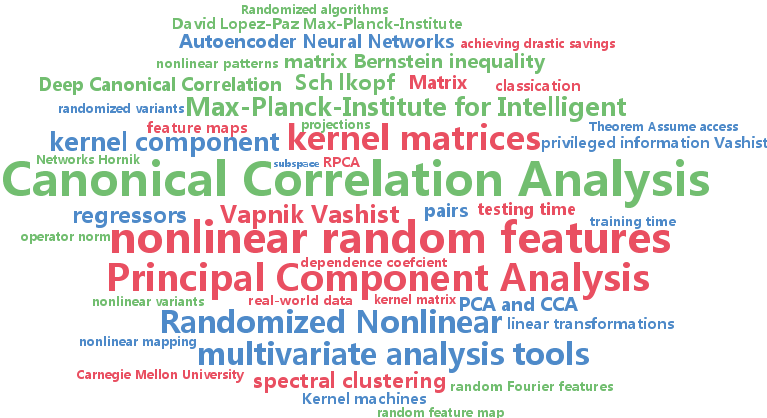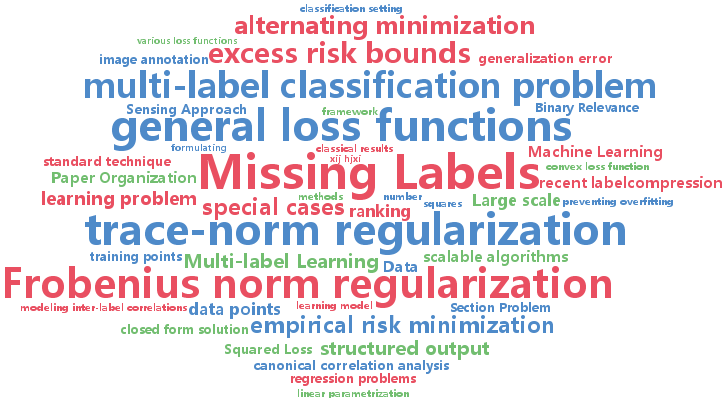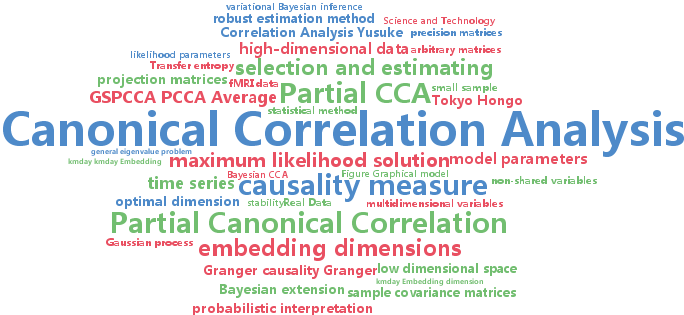canonical correlation analysis
-
David Lopez-Paz and Suvrit Sra and Alex Smola and Zoubin Ghahramani and Bernhard Schoelkopf
Randomized Nonlinear Component Analysis (pdf)
Classical methods such as Principal Component Analysis (PCA) and Canonical Correlation Analysis (CCA) are ubiquitous in statistics. However, these techniques are only able to reveal linear relationships in data. Although nonlinear variants of PCA and CCA have been proposed, these are computationally prohibitive in the large scale. In a separate strand of recent research, randomized methods have been proposed to construct features that help reveal nonlinear patterns in data. For basic tasks such as regression or classification, random features exhibit little or no loss in performance, while achieving drastic savings in computational requirements. In this paper we leverage randomness to design scalable new variants of nonlinear PCA and CCA; our ideas extend to key multivariate analysis tools such as spectral clustering or LDA. We demonstrate our algorithms through experiments on real-world data, on which we compare against the state-of-the-art. A simple R implementation of the presented algorithms is provided.
-
Hsiang-Fu Yu and Prateek Jain and Purushottam Kar and Inderjit Dhillon
Large-scale Multi-label Learning with Missing Labels (pdf)
The multi-label classification problem has generated significant interest in recent years. However, existing approaches do not adequately address two key challenges: (a) scaling up to problems with a large number (say millions) of labels, and (b) handling data with missing labels. In this paper, we directly address both these problems by studying the multi-label problem in a generic empirical risk minimization (ERM) framework. Our framework, despite being simple, is surprisingly able to encompass several recent label-compression based methods which can be derived as special cases of our method. To optimize the ERM problem, we develop techniques that exploit the structure of specific loss functions - such as the squared loss function - to obtain efficient algorithms. We further show that our learning framework admits excess risk bounds even in the presence of missing labels. Our bounds are tight and demonstrate better generalization performance for low-rank promoting trace-norm regularization when compared to (rank insensitive) Frobenius norm regularization. Finally, we present extensive empirical results on a variety of benchmark datasets and show that our methods perform significantly better than existing label compression based methods and can scale up to very large datasets such as a Wikipedia dataset that has more than 200,000 labels.
-
Yusuke Mukuta and tatsuya Harada
Probabilistic Partial Canonical Correlation Analysis (pdf)
Partial canonical correlation analysis (partial CCA) is a statistical method that estimates a pair of linear projections onto a low dimensional space, where the correlation between two multidimensional variables is maximized after eliminating the influence of a third variable. Partial CCA is known to be closely related to a causality measure between two time series. However, partial CCA requires the inverses of covariance matrices, so the calculation is not stable. This is particularly the case for high-dimensional data or small sample sizes. Additionally, we cannot estimate the optimal dimension of the subspace in the model. In this paper, we have addressed these problems by proposing a probabilistic interpretation of partial CCA and deriving a Bayesian estimation method based on the probabilistic model. Our numerical experiments demonstrated that our methods can stably estimate the model parameters, even in high dimensions or when there are a small number of samples.


